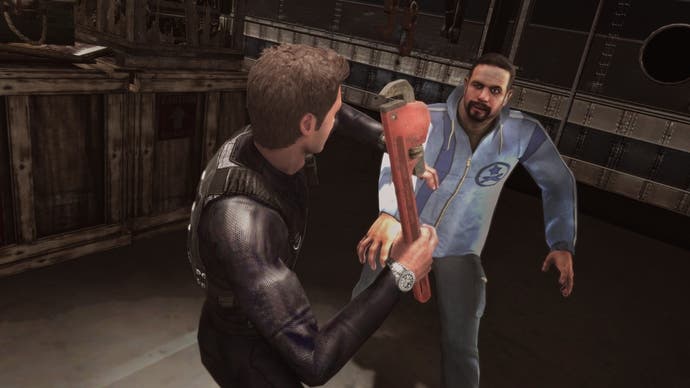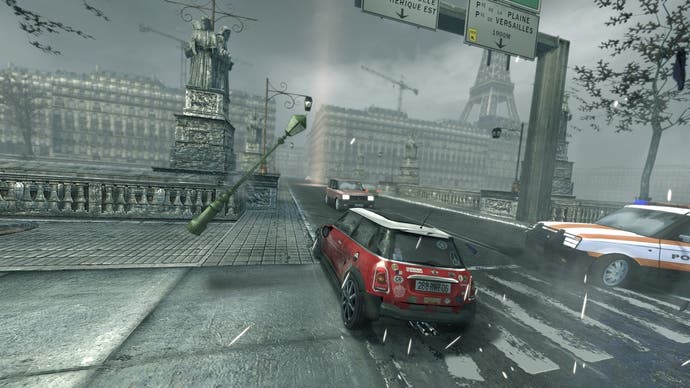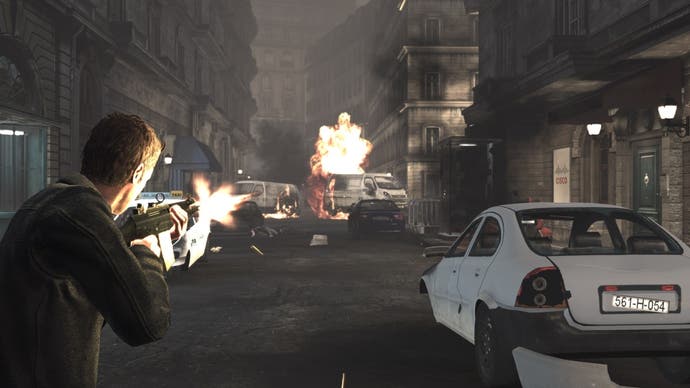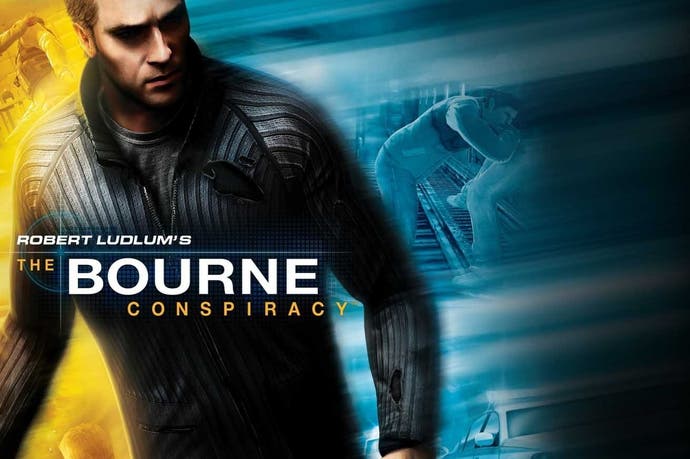How The Bourne Conspiracy struggled to find its own identity
Slack ops.
Jason Bourne isn't much of a talker. Jason Bourne is a doer, with deeply imprinted training that makes him act so instinctively and decisively, it can seem like brutality, even to him. For the first act of Doug Liman's The Bourne Identity, he's a confused amnesiac in a scruffy orange jumper, just starting to get a handle on his previous life as a chameleonic, blackest-of-black-ops assassin. Reconciling lethal muscle memory with his innate sense of self is clearly twisting Bourne up inside - it's the rubber-band motor that powers the entire movie and, subsequently, the Bourne franchise. It's also a slippery question: how can he do these things?
Similar thoughts of agents and agency might float through your mind while replaying The Bourne Conspiracy, developed by High Moon Studios and released by Sierra in 2008. It's a game stuffed with spectacular moments where, as Bourne, you pull off surprising, uncanny feats: balletic dodges, improbable one-shot kills and brutal improvised takedowns. Admittedly, it's a thrill almost every single time, but there remains a nagging undertow: how did I just do that? Who exactly is in control?

Questions, questions. Foremost among them could be: was the world crying out for a Bourne video game in 2008? From a corporate spreadsheet point of view, maybe it was. The film trilogy wrapped up in 2007 with a surprising sense of finality, so here was an opportunity to slipstream a global movie franchise with a considerable existing audience who probably wanted to keep the adventure going, or at least relive some iconic parts of it. An army of fanboys (and fangirls), keen to "become Bourne", as the marketing promised. Some of them clearly worked at High Moon Studios.
The Bourne Conspiracy necessarily pays lip service to the original novels - it was Robert Ludlum's literary estate that granted the license, and the author gets top billing on the box - but the real Treadstone touchstone is Liman's movie. The Bourne Conspiracy is essentially an intensive scene-by-scene remake of The Bourne Identity via a meat-and-potatoes third-person game engine, expanding familiar moments into longer experiences, and even repurposing lines of dialogue as cheat codes. ("Last chance, Marie.") It also exploits Bourne's Swiss cheese memory by inventing previous Treadstone operations to fill in some backstory, creating entire new missions that Bourne experiences in flashback.
But like Tony Gilroy, writer/director of the 2012 side-sequel The Bourne Legacy, High Moon Studios didn't have access to Matt Damon, who had no interest in lending his voice or likeness - his identity, if you like - to a videogame. So the Bourne you control is even more of a cipher than the movie version: visually, he looks and moves like Nathan Drake's tipsy stunt double, with a cheeky hint of Ben Affleck in his jawline.

The digital Bourne is effective, often devastatingly so, but there's no dodging the fact that he isn't Damon, and that makes every giddy evocation of the original movie - the constant use of John Powell's pulsing score, Franka Potente's plucky voice acting as Marie, that lovingly rendered orange fisherman's jumper - trigger a moment of cognitive dissonance. Being headache-inducing might be yet another devoted nod to The Bourne Identity, where Treadstone operatives complained of migraines caused by their behavioural conditioning, but it doesn't make it any less distracting.
The lone driving level is emblematic of this overwhelming sense of committed but ultimately confused tribute. Just like in the movie, you get to evade gendarmes by flooring it down Parisian backstreets, but you do it in a modern Mini Cooper rather than Marie's scruffy Italian Job banger. For fans of handbrake-happy arcade game GTI Club it's like biting into one of Proust's madeleines. But for everyone else, it's a jarring detour.
The real problem at the heart of building a game around Bourne is that to be an effective solo operative, he's hard-wired to avoid confrontation whenever possible. Yet in The Bourne Conspiracy, you're continuously required to plough through dozens of bad guys to achieve your supposedly covert aims, toggling between the sparky hand-to-hand combat and lacklustre gunplay as the situation dictates. When inhabiting a character who is famous for changing strategies on the hoof, being funnelled down yet another corridor to unavoidably engage anonymous thugs feels irritatingly forced, especially when evocative European cities are reduced to lab-rat mazes.
At key moments, you can incapacitate one, two or even three enemies simultaneously with an adrenalised burst of spectacular QTE ultraviolence, tasty pre-baked finishers that feel like a forerunner to Batman's now-fashionable Arkham lethality. These takedown animations are thrilling but entirely passive, even cutting away to a more cinematic presentation. Sure, for a split-second you feel like Bourne. But most of the time - drip-dripping entry-level Krav Maga strikes to fill up an adrenaline meter - you're just bored.

At least the audio design is excellent, from the meat-thwacking combat FX to a nifty wobbleboard sample - lifted from the film - that acts as a sort of spider-sense, allowing you to instinctively knobble surprise attacks through more QTE prompts. But even if The Bourne Conspiracy is no worse than the last half-dozen Bond games, it never manages to transcend the sense that this is not what Bourne would do. If you never played it at the time, picking it up now is a bit like seeing The Bourne Identity is on ITV2 for the umpteenth time - if you're a fan, you'll happily sit through it, but it all feels a little over-familiar to be truly exciting.
It does make you wonder what the ideal Bourne game would be like. Some sort of dense Euro city sandbox where you have to neutralise targets and retrieve key files using limited resources? A lo-fi hacking game where you get all the mission data you require from a lickety-split Google session in a Parisian internet café? A sniper game with voice input so you can interrogate your targets? A shopping sim where you can only buy natty black coats? Perhaps the real problem is that the Bourne movies disrupted culture to such an extent that they have already been absorbed, referenced and recreated - in movies, in TV and in games - to the extent that a standalone Bourne game seems superfluous. I always liked how Matt Damon shimmied down the sheer walls of the US embassy in The Bourne Identity. Now every other third-person game lets me effortlessly scramble up cliffs by holding down a shoulder trigger.
The climax of The Bourne Conspiracy dovetails with the end of The Bourne Identity, hinting that similarly covert adaptations of the later Paul Greengrass movies could have followed. But both developer and publisher were absorbed into Activision Blizzard during a mighty merger in 2008, becoming mere assets to be redeployed. High Moon Studios were appointed custodians of the Transformers videogame franchise, a universe where fannish dedication is greatly appreciated and a certain clunkiness comes with the territory. Ultimately, it was probably a better fit than Bourne.


